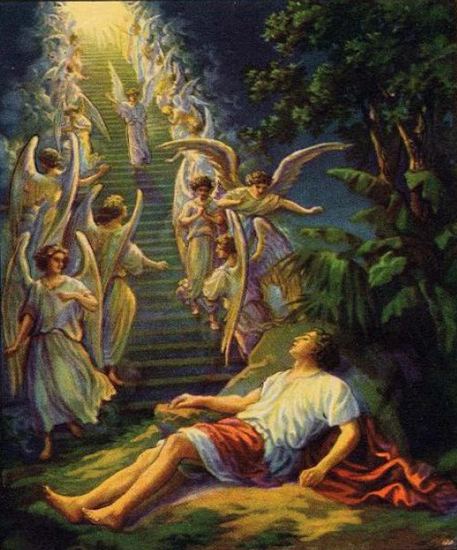
On his way to Haran, Jacob stops for the night. He puts a stone beneath his head and sleeps. He dreams of a staircase that goes from earth to heaven with angels traveling up and down. Echoing His promise to Abraham, the Lord tells Jacob He will give him the land and bless all peoples through him (Gen. 28:10-15).
Jacob wakes in awe. He sets up the stone that was under his head, anoints it with oil, and renames the place Bethel: House of God (Gen. 28:16-19).
Jesus applied this passage to Himself and said His disciples would see “heaven opened and the angels of God ascending and descending on the Son of Man” (John 1:51). Jesus would open heaven and be the way to heaven.
Christ is also pictured in the stone Jacob set up. Jacob laid the stone down in sleep by his head. Then Jacob set it up and anointed it with oil. This shows Christ, our head, who slept for three days in the grave. He rose and ascended–God set Him up and anointed Him with the fullness of the Spirit as His eternal King.
In His resurrection, Jesus became the House of God, as He told the Pharisees: “Destroy this temple, and I will raise it up in three days” (John 2:19). Jacob renaming the place he slept “House of God” prefigures this because God’s house is His temple.
As the body of Christ, joined to our Head, we too are God’s house and temple. This is the further meaning of Bethel. One stone doesn’t make a temple just as a head alone doesn’t make a body. Peter says, “Coming to Him, a living stone…you yourselves, as living stones, are being built into a spiritual house….” (1 Peter 2:5).
Jacob says two significant things about the House of God. First: “Surely the LORD is in this place….” (Gen. 28:16). The Lord is in us, His house. “You in I, and I in You” is the relationship here. The Lord is here! Within us! Jacob was afraid to learn the Lord was at Bethel. It is an awesome thing to realize God is within. We do not know this at first, just as Jacob wasn’t aware the Lord was at Bethel. But when it pleases God, He reveals His Son in us, and we know He is there (Gal. 1:15-16).
The other thing Jacob says is, “This is none other than the house of God. This is the gate of heaven” (Gen. 28:17). Under the old covenant, the temple was God’s dwelling, His point of contact in the earth. This pictured the temple of Christ, who said, “I am the way, the truth, and the life. No one comes to the Father except through Me” (John 14:6). As stones in the house and temple of Christ, we share in being the way, the gate of heaven.
What a sobering thought! But it is true. Jesus gave us the keys of the kingdom of heaven (Matt. 16:19). Typologically, Israel failed this responsibility, as shown by Jesus’s rebuke of the Pharisees: “You lock up the kingdom of heaven from people. For you don’t go in, and you don’t allow those entering to go in” (Matt. 23:13).
God is in us, His house. Through this house, as he told Jacob, He wants all nations to be blessed. It is not for us to shut up our doors and hoard God. We must know He is within by revelation and invite others to know Him. Failing that, we operate based on pious ignorance; we create barriers to God out of religious imaginations.
This is not God’s intention for the church. He wants us to wake in the light of Christ and recognize He is in us and that we have become His gates in Christ!
This is an interesting subject. Over the last month or so I’ve been reading the Quran. I was surprised that they call Jesus the Messiah, but they also believe Mohammad and Jesus had the same mission, that their prophet status was equal. They believe both men were to bring wayward people back to God. The book rails Jews for rejecting Jesus as the Christ and for not accepting the “good news.” It also warns Christians that believing Jesus is God goes beyond the limits of truth. I wondered what they thought Messiah was. What did they think “the good news” was if it was not that God so loved the world he gave his unique son? To me it seems obvious that the roll of Messiah and that of a simple prophet are not equal, nor would they have exactly the same mission. To them messiah just means anointed and all prophets and kings were anointed. Being Messiah did not make Jesus more special that Mohammad. That set me to researching the word Messiah. This passage is the first usage of the word. There is so much communicated just below the surface symbolism. The Bible is such a rich treasure, deep and wide, simple enough for children to get the main point, complex enough that a lifetime will never be enough to study its depth. It is worth the passion you pour into it!
How interesting! I didn’t realize this was the first use of “messiah.” I’m going to have to consider the significance of that! Your explanation of the Muslim view gives perspective. From that point of view, why would they see Jesus as special? Maybe that’s part of the importance of Jesus being prophet, priest, and King (offerings too were anointed). He was/is the sum of every messianic office. Or (maybe more to the point) those offices only existed as pictures of Him from the beginning. In that case, He didn’t come as just another prophet but as the reality of which prophets were shadows…? Thanks for the comment 🙂
Thanks for the link! It’s cool that the Lord showed you His Son in the anointed stone 🙂